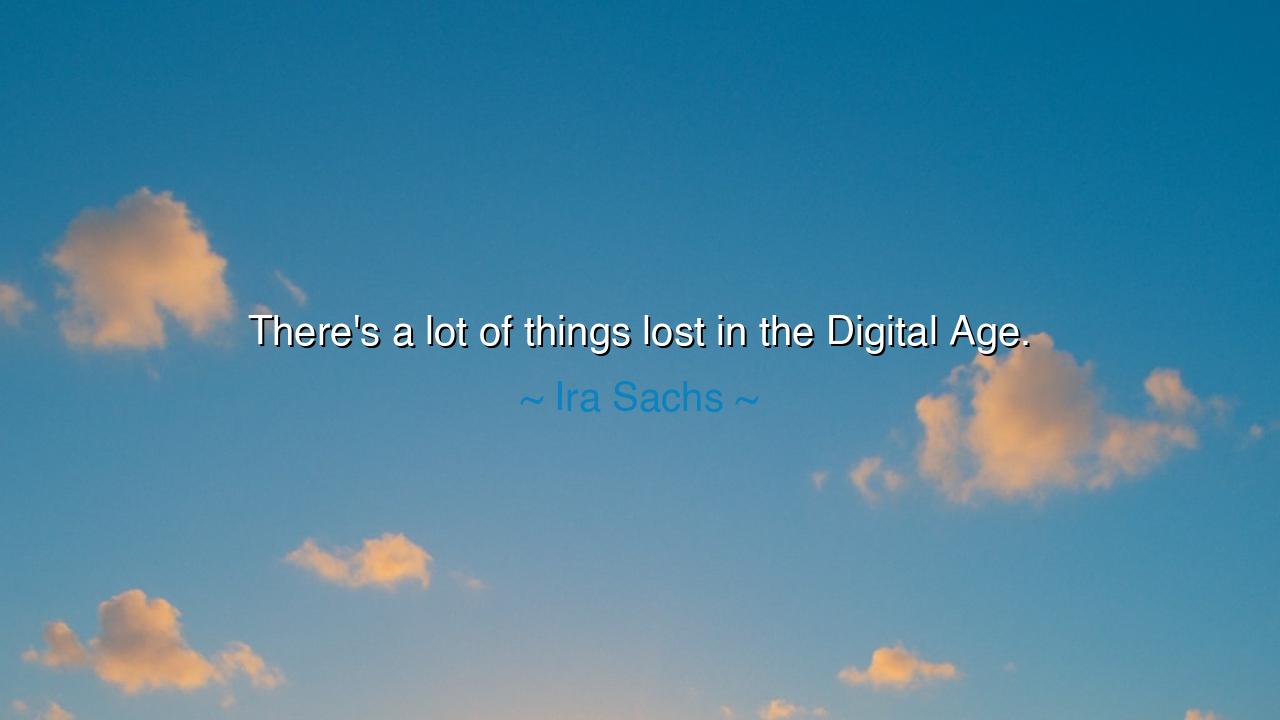
There's a lot of things lost in the Digital Age.






In the ever-shifting tides of human progress, there comes a moment when the very forces that advance us also begin to erode the foundations upon which our humanity stands. Ira Sachs speaks of this delicate balance when he reflects, "There's a lot of things lost in the Digital Age." These words, though simple, carry a profound truth about the cost of technological progress—the losses we face as we dive deeper into a world of screens, algorithms, and virtual connections. The digital realm, while offering convenience and expansion, may also rob us of the deeper, more tactile experiences that once defined our existence. The warmth of human connection, the stillness of contemplation, and the richness of personal interaction seem to fade in the face of this relentless march toward digital dominance.
In the ancient world, the wisdom of Socrates, who valued face-to-face dialogue above all else, reflects a truth that has been passed down through centuries. Socrates believed that knowledge was best attained through direct conversation and engagement, where the exchange of ideas was not just intellectual, but deeply personal. The act of speaking, of looking into another’s eyes, of feeling the weight of their words and body language, carried a depth that no written word or digital interaction could convey. Socrates might have seen the rise of the Digital Age not with excitement, but with caution, understanding that the deeper connections he sought to cultivate in the agora of Athens could be replaced by the cold, impersonal world of electronic communication.
Consider also the Romans, who placed great emphasis on the art of letter-writing. In their letters, the nuances of language and the emotional tone were carefully considered, for the written word was not simply a means of transmitting information, but a personal expression. When Cicero wrote to his friend Atticus, it was not just about conveying facts but about connecting on a deeper level, sharing experiences, reflections, and even fears. The Roman letter was a sacred space for intimacy and connection—something that is now, in the age of emails and texts, often reduced to shorthand, devoid of the emotional weight that once made communication meaningful.
In the modern world, Ira Sachs' words ring truer than ever. The rise of social media has fundamentally altered how we interact, turning deep, authentic connections into fleeting, superficial exchanges. Friendships, once built on shared experiences and long conversations, now often rely on status updates and likes. The loss of personal connection is perhaps the most profound cost of this digital age. Face-to-face encounters, once the cornerstone of human experience, are being replaced by text-based interactions that lack the depth, warmth, and vulnerability of physical presence. What was once a shared human experience—gathering around a table to converse, to reflect, to laugh—now becomes a solitary experience in front of a screen.
In a world where we are constantly connected, we may find ourselves more isolated than ever. The act of disconnecting from the digital world, of stepping away from the incessant chatter of social media and technology, becomes an act of rebellion—a call to reclaim what has been lost. There is a profound beauty in silence, in reflection, and in the slow, deliberate exchange of thoughts and emotions that technology often cannot replicate. The ancients knew the value of this space—of the pause, of the waiting, of the unhurried conversation. These are the moments in which true connection is made, and in our rush to embrace the digital, we may have lost sight of their importance.
Yet, Ira Sachs’s warning is not a condemnation of technology, but a call to balance. The Digital Age offers great benefits—access to knowledge, the ability to connect with others across vast distances, and new opportunities for learning and innovation. But we must not lose ourselves in it. The lesson is clear: in our pursuit of progress, we must remember the importance of the tangible, of real-world connections, and of meaningful experiences that technology cannot replace. The digital world should serve as a tool, not a replacement for the richness of human life.
Practical action calls us to be mindful of how we engage with technology. Let us not allow it to replace the simple joys of human connection, but rather use it as a bridge that enhances those connections. Seek to disconnect regularly, to immerse yourself in conversations, to engage with the world directly, and to reconnect with those around you in ways that go beyond the screen. The ancient wisdom teaches us that true fulfillment is found not in the superficial, but in the authentic, in the spaces where our humanity is allowed to thrive in its fullest expression. Let us carry this wisdom into the future, using technology wisely, and never losing sight of what is most important—the deep, lasting connections that make us human.






AAdministratorAdministrator
Welcome, honored guests. Please leave a comment, we will respond soon